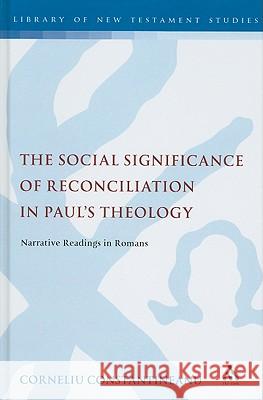The Social Significance of Reconciliation in Paul's Theology: Narrative Readings in Romans » książka
The Social Significance of Reconciliation in Paul's Theology: Narrative Readings in Romans
ISBN-13: 9780567581983 / Angielski / Twarda / 2010 / 272 str.
The Social Significance of Reconciliation in Paul's Theology: Narrative Readings in Romans
ISBN-13: 9780567581983 / Angielski / Twarda / 2010 / 272 str.
(netto: 782,40 VAT: 5%)
Najniższa cena z 30 dni: 793,21 zł
ok. 30 dni roboczych
Bez gwarancji dostawy przed świętami
Darmowa dostawa!
Traditional exegetical scholarship has treated Paul's presentation of reconciliation as referring to reconciliation between people and God, and has primarily focused use of the word katallage - traditionally translated as atonement'. Constantineanu challenges this view and argues that Paul's understanding of the concept is more complex, employing rich symbolism to describe reconciliation with God and between human beings forming together an inseparable reality. The discussion is placed within Paul's overall religious, social and political contexts, showing that an analysis of the social dimension of reconciliation in his thought is both plausible and necessary. Constantineanu offers an analysis of two major sections of Romans, chapters 5-8 and 12-15. Special emphasis is placed on Paul's use of the story of Jesus for community formation, for the shaping of identity, values and community practices. It is thus demonstrated that for Paul God's reconciling initiative, shown in the crucifixion, is not only the pronouncement of God's reconciling the world, but also the ground and model for reconciliation among human beings.











